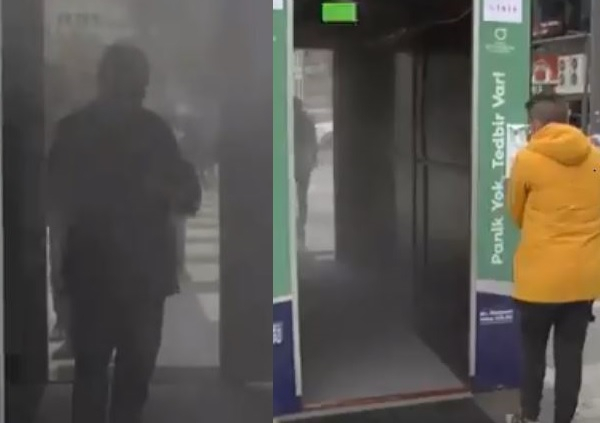With coronavirus cases increasing every day, countries are installing various methods to curtail the effect of the virus spread. Disinfection is considered as one of the ways to keep the virus in check. Countries including Turkey, Thailand, China, Vietnam and even some parts of India have installed disinfection tunnels with the aim of keeping the virus away.
Videos of disinfection tunnels in Turkey and India are making rounds in the social media. Though authorities have claimed it as an effective way to kill the virus, there has been no scientific study done which proves that disinfecting human beings kills the virus.
Do disinfection tunnels have any adverse effects on health?

These tunnels show people using hand sanitizers and then entering the tunnel that releases 'disinfecting gases' as people pass through the tunnel. Reports claimed that at least two thousand people pass through the tunnel in the city of Ordu in Turkey, where people while going to work and while returning home pass through the tunnel and disinfect themselves.
As the disinfecting tunnels became popular in Turkey, Vietnam, China, Thailand, the state of Tamil Nadu in India too installed disinfecting tunnels on streets. This was followed by the state of Karnataka in India. But now reports claim that people in Tamil Nadu are saying no to disinfection tunnels as it is said that these gases inside disinfection tunnels also might be dangerous than the virus as it can result in irritation into eyes and skin allergies.
Recently videos of people being sprayed with disinfection gases in Uttar Pradesh state in India was criticized at the national level and it was deemed dangerous by the health experts. Disinfection tunnels too work similarly and it is said if not sprayed in moderation, it might result in having side effects on the health of the people.
Here is why disinfecting streets is dangerous
Many countries including Turkey took measures to disinfect streets to kill coronavirus and check the spread of the pandemic in the country. Though this method has been widely practised, environmentalists opposed the move as they said this action will create an imbalance in the ecology.
This not only effects coronavirus but millions of bacteria that are present helping keep the balance of the ecosystem. As per a report in Hurriyetddailynews.com, an expert said that disinfecting streets cannot kill millions of viruses and bacteria in the world. These bacteria help in the sustainability of the ecosystem. He advised that the authorities should not move away from scientific methods while doing installing a new system.
Sanitizing hands the best method?
Many experts state that than dangerous methods of disinfecting tunnels or disinfecting streets, sanitizing hands with regular hand wash is said to be the best way to keep the virus and germs away, apart from other methods including social distancing and following the lockdown rules.
In Turkey, the sanitizer called Kolonya is said to be the most effective way of keeping the virus at check as it contains at least 60 percent alcohol. Another report in BBC, quoting a physician from Istanbul claimed that most of the Kolonya products (disinfectants including hand sanitizers) contain 80 percent alcohol.
Turkey government even stopped seeking ethanol for petrol so that production of Kolonya can be boosted and hand sanitizers made of Kolonya are available for the people to use especially in the time of the pandemic. The direction was given on March 13. Though Kolonya is not a cure but just a way to keep the hands sanitized, the news of Turkey's Minister of Health championing Kolonya's capacity to fight the coronavirus led to the sale of the product increasing fivefold, just like the demand for Hydroxychloroquine increased after Trump championed the use of the anti-malarial drug.









